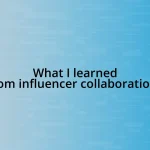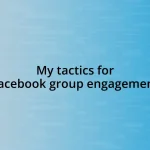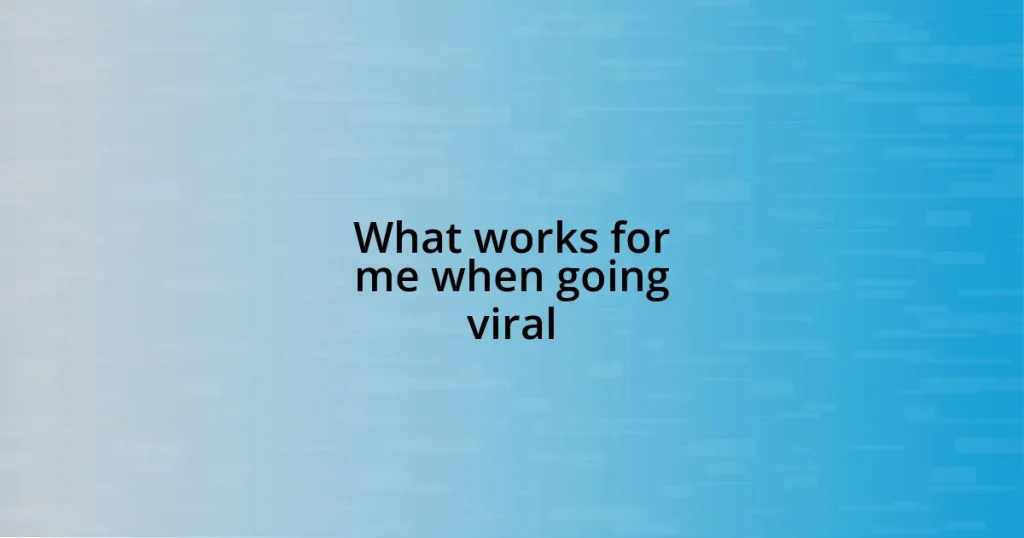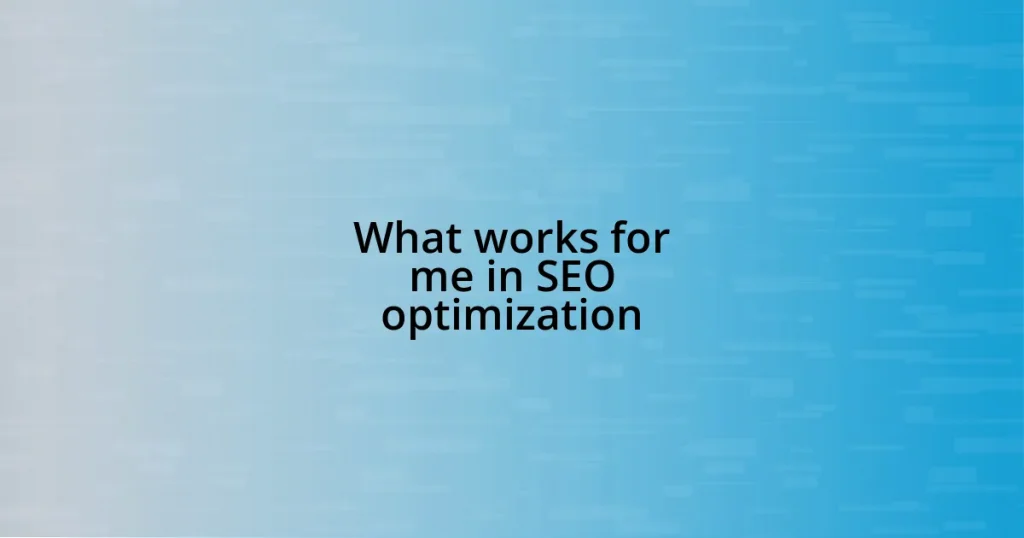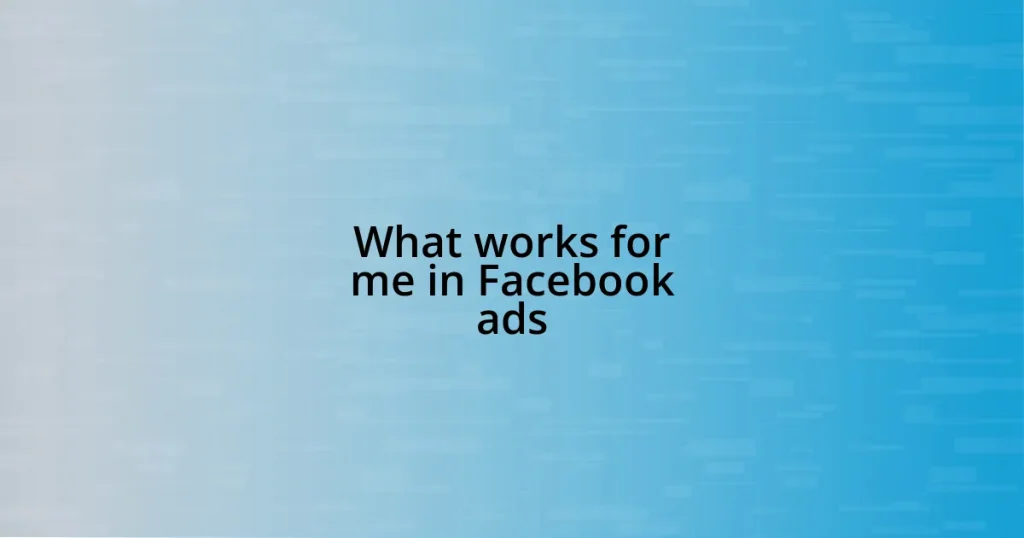Key takeaways:
- Successful sponsorships hinge on clear communication, mutual goals, and aligning values between the brand and the individual.
- Building genuine relationships with sponsors through engagement and consistency strengthens partnerships and fosters trust.
- Measuring sponsorship success involves both quantitative KPIs and qualitative feedback, ensuring continuous improvement and deeper connections.
- Flexibility and openness to change during negotiations and campaigns can lead to unexpected benefits and stronger collaborations.
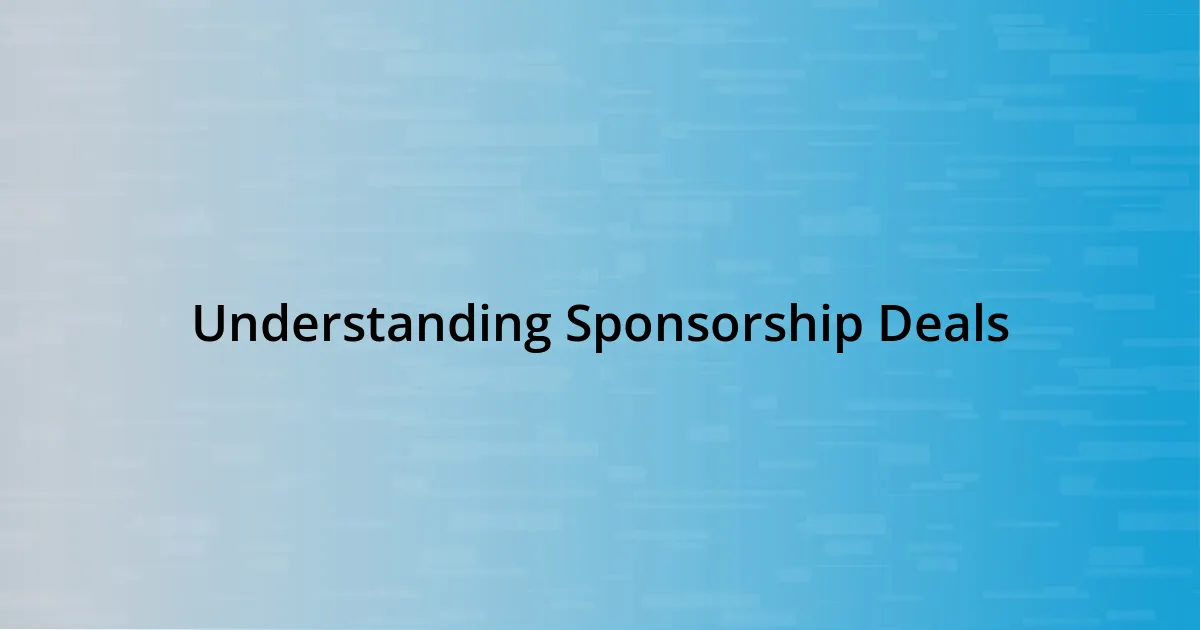
Understanding Sponsorship Deals
When I first encountered sponsorship deals, I found them to be a fascinating blend of business strategy and personal ambition. It struck me how these deals can connect brands with individuals or organizations that embody their values; it’s almost like matchmaking in the corporate world. Have you ever thought about what makes a sponsorship truly effective? In my experience, it’s the clarity of expectations and mutual goals that paves the way for success.
Navigating the intricacies of sponsorship deals can feel overwhelming at times. I remember feeling a surge of anxiety when drafting my first contract, wondering if I was missing something crucial. But over time, I learned that clear communication and honesty lay the foundation for a strong partnership. It’s vital to lay out not just what you will do for the sponsor, but what you expect in return, fostering a relationship built on trust.
I’ve also come to appreciate the emotional rollercoaster that sponsorship deals can sometimes create. The excitement of securing a partnership can quickly turn into stress if the brand’s vision doesn’t align with your own. Have you experienced that push and pull? I certainly have, and it taught me the importance of being selective in the deals I pursued, ensuring they resonated not just financially but also personally.
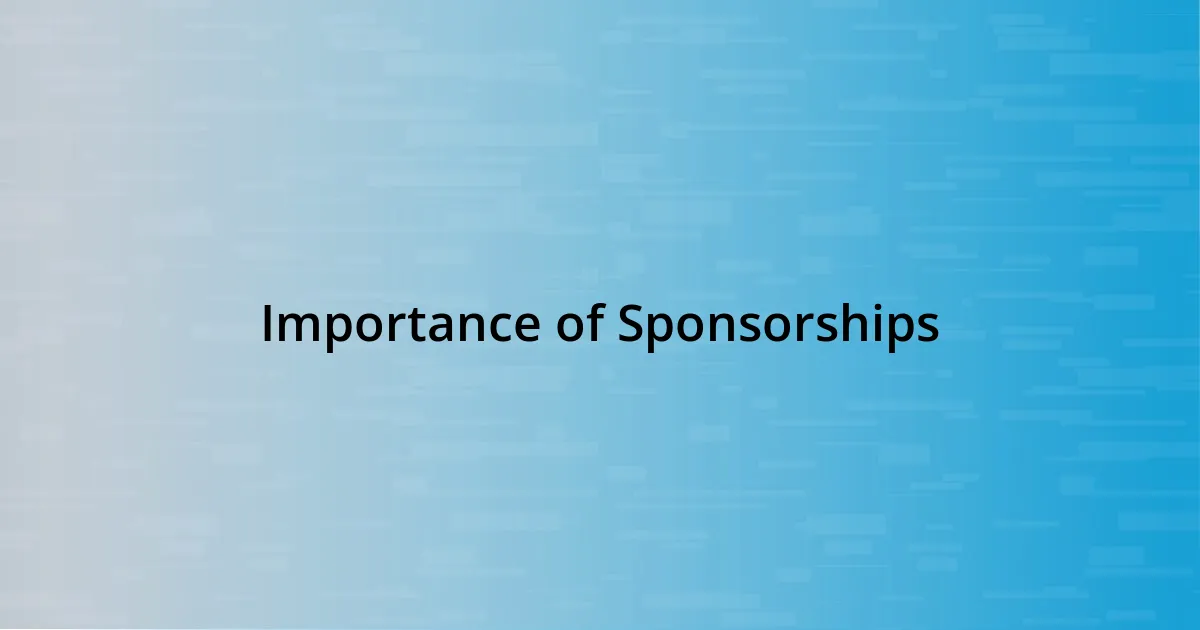
Importance of Sponsorships
The significance of sponsorships can’t be overlooked. They serve as powerful catalysts for growth, not just financially, but also in building credibility and visibility. I vividly recall my early days when securing my first sponsorship deal transformed my platform overnight. Suddenly, I had access to resources I could only dream of, and it felt like being given a golden ticket to a larger stage—one where my voice truly mattered.
- Pinpoints potential revenue streams, allowing creators to focus more on their craft.
- Elevates brand awareness, aligning both the sponsor’s and the individual’s vision for greater reach.
- Facilitates networking opportunities, opening doors to collaborations that can amplify impact.
In essence, sponsorships are more about shared journeys than mere transactions. They encourage a deeper connection between brands and individuals, creating a tapestry of mutual growth and support that enriches all involved.
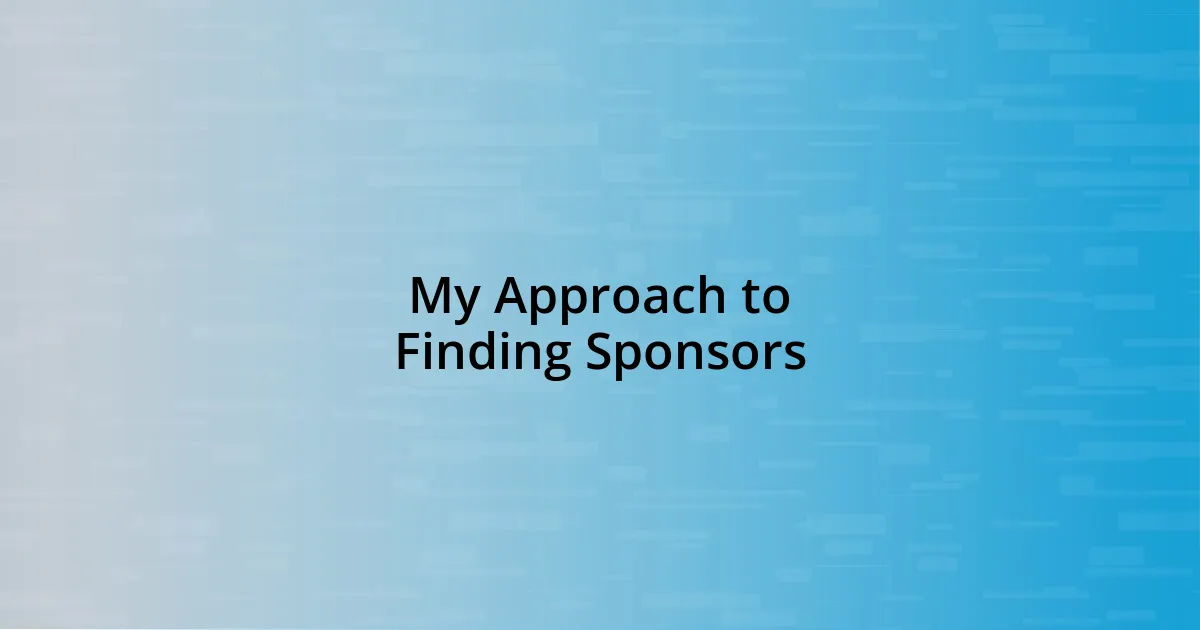
My Approach to Finding Sponsors
Finding the right sponsors has been a journey of exploration. In my experience, I’ve learned to start by defining my unique value proposition. This means understanding what I bring to the table—be it my audience, creative talents, or niche expertise. I remember the time when I sat down and mapped out my strengths, which eventually guided me to reach out to brands that genuinely aligned with my mission.
The process doesn’t stop at identifying potential sponsors; it involves building genuine relationships. I often engage with brands on social media before pitching a collaboration. I recall a specific instance where I shared a post about a product I loved, which led to a conversation with the brand’s marketing director. That interaction blossomed into a partnership, and it highlighted how authenticity and genuine interest can open doors that a pitch alone might not.
I also believe that research is key. I spend time learning about a brand’s values and past sponsorships. This background knowledge allows me to tailor my proposals more effectively. For instance, during one outreach, I discovered that a particular brand was focused on sustainability; I crafted my pitch around eco-friendly initiatives I’d been working on. That alignment resonated with them, and we struck a deal that felt meaningful, not just transactional.
| Approach | Emotional Insight |
|---|---|
| Define Unique Value | Understanding and clarity of what I offer creates confidence. |
| Build Relationships | Authenticity fosters connections, making partnerships feel natural. |
| Conduct Research | Knowledge empowers my proposals, leading to meaningful collaborations. |
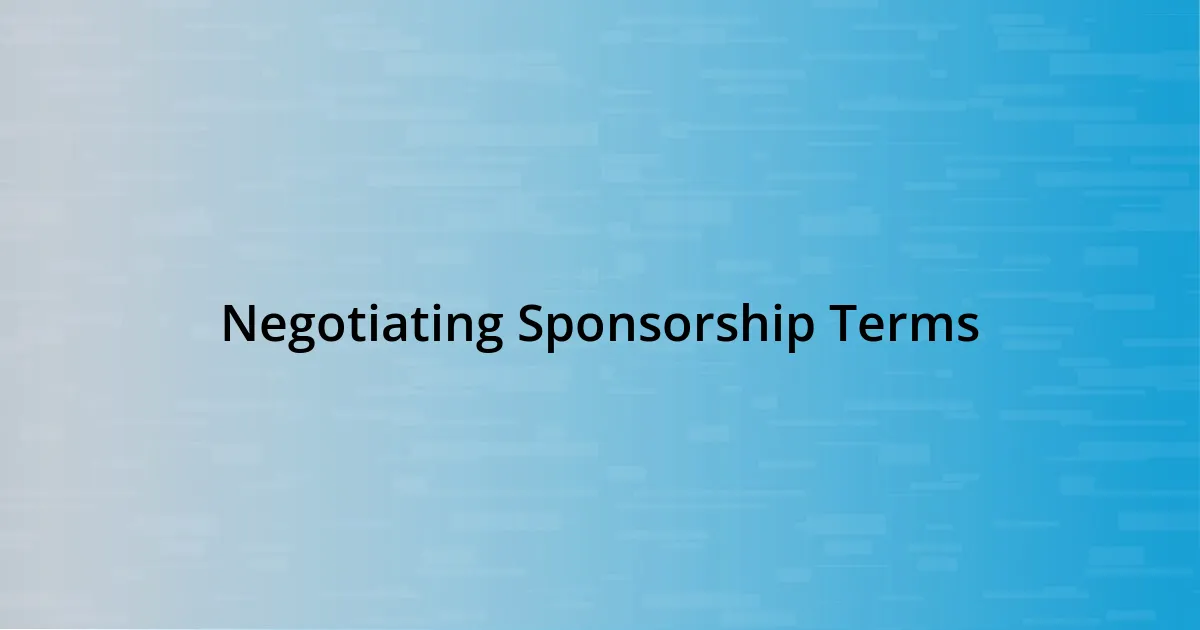
Negotiating Sponsorship Terms
Negotiating sponsorship terms can feel daunting, but I’ve learned it’s all about clarity and confidence. One of the first deals I negotiated was intimidating; I walked into the meeting with a hopeful mindset but unsure of what to ask for. However, after doing my homework and knowing my worth, I found myself articulate my needs, including financial support and creative freedom. When I stood firm on my requirements, not only did I earn their respect, but I watched their faces light up at the idea of a partnership built on mutual benefits.
An important aspect I’ve discovered is to foster open communication. Early on, I negotiated a deal where I felt a bit overwhelmed, focused solely on the numbers. It wasn’t until I started asking questions, like, “What are your priorities in this partnership?” that I realized we could create something far more valuable together. By sharing goals and expectations, I turned what initially felt transactional into a collaboration that aligned our vision. That shift in perspective helped me secure better terms that supported my vision, proving that negotiation is not just about what I want, but understanding the other party’s needs as well.
I also find it useful to be prepared for the give-and-take nature of negotiations. At one point, I was keen on securing a specific deliverable. Instead of insisting on my terms, I offered multiple options that fit into their objectives, which ultimately opened the door to creatively fulfilling the sponsor’s needs while keeping my integrity intact. Have you ever considered how flexibility in negotiations can lead to unexpected wins? In my experience, it’s this willingness to adapt and understand both sides that often leads to thriving partnerships where everyone leaves the table satisfied.

Building Relationships with Sponsors
Building relationships with sponsors goes beyond just making a pitch; it’s about fostering connections that feel genuine and reciprocal. I remember when I first reached out to a local brand for a collaboration. Instead of sending a generic proposal, I took the time to engage with them on social media—commenting on their posts and appreciating their products. This small gesture opened the door for a more meaningful conversation, showing me how valuable personal interaction can be in establishing trust before formal discussions.
As I’ve navigated these relationships, I’ve realized that consistency is key. I make it a point to check in with sponsors regularly, even when we’re not collaborating on a project. For instance, after one successful campaign, I sent a handwritten thank-you note to the brand. It wasn’t just about gratitude; it was a way of saying I value our partnership. Have you ever considered how a simple gesture can strengthen business ties? From my perspective, it creates a sense of belonging, turning a working relationship into one where both parties genuinely care for each other’s success.
Additionally, I’ve found that transparency pays off. During a partnership with a travel company, we had some hiccups with deliverables that caused concern on both sides. Instead of shying away from the issue, I initiated a conversation to address our concerns openly. This not only built trust but also gave us both a clearer roadmap for our collaboration moving forward. I often think about how honesty can transform potential conflicts into opportunities for growth—both personally and professionally. Isn’t it refreshing to know that being authentic in business can lead to long-lasting, fruitful relationships?
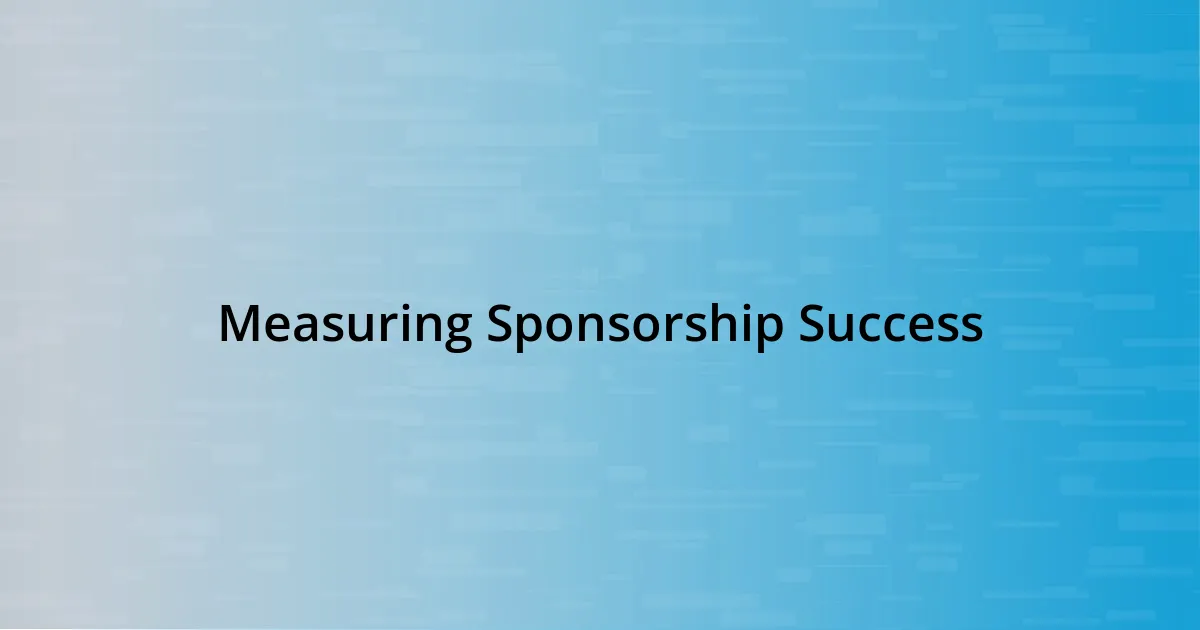
Measuring Sponsorship Success
Measuring the success of a sponsorship deal is essential to understanding its impact on both parties. Personally, I’ve found that one of the most effective ways to assess this is through key performance indicators (KPIs). For instance, during a recent partnership with a fitness brand, we established clear goals at the start, such as engagement metrics and sales figures. By analyzing these numbers after the campaign, we got concrete evidence of what worked and where adjustments were needed.
Moreover, qualitative feedback plays a crucial role in this process. After a campaign, I often reach out to my audience to gather their thoughts on the collaboration. I remember receiving a heartfelt message from a follower who shared how our collaboration inspired them to try new workouts. These emotional connections are valuable as they reflect the real-world impact of the sponsorship, going beyond mere metrics to resonate on a personal level. Has your audience ever surprised you with their feedback? It’s moments like these that validate the efforts and creativity put into the collaboration.
Finally, regular reflection is vital for measuring success. I like to hold a debriefing session not only with my team but also with the sponsor. During one such session, we discussed our experiences, what we loved, and what could have been better. This candid exchange sparked new ideas for future partnerships, creating a cycle of continuous improvement. I believe measuring success isn’t just about the numbers; it’s about nurturing a habit of open dialogue and learning from every opportunity. Isn’t it fascinating how these discussions can lead to even stronger collaborations down the line?
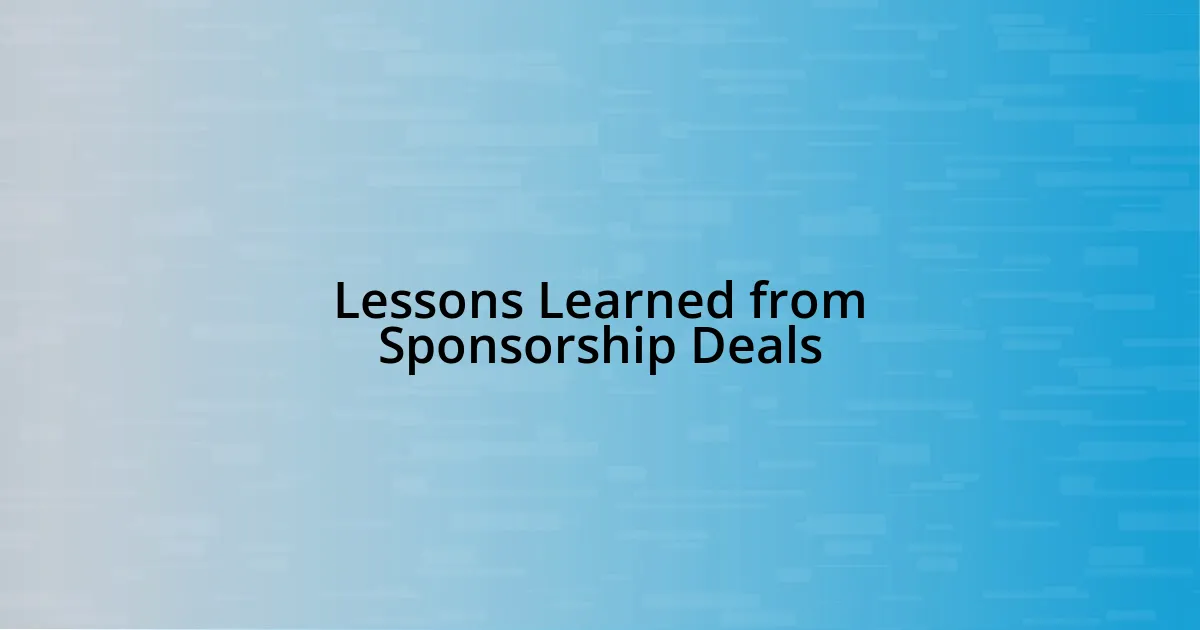
Lessons Learned from Sponsorship Deals
One significant lesson I’ve learned is the importance of aligning values with sponsors. Early in my experience, I partnered with a brand that didn’t resonate with my audience’s interests, solely because the numbers seemed appealing. It became painfully clear during the campaign—there was a disconnect. This taught me that it’s crucial to work with brands that genuinely reflect my beliefs and the values of my community. Have you ever noticed how authentic partnerships feel more rewarding and impactful? When both parties share a vision, the collaboration can flourish in ways that go beyond mere transactions.
Flexibility is another vital lesson I picked up along the way. I remember a sponsorship deal that initially seemed set in stone, but as we progressed, changes became necessary. Instead of resisting, I embraced the shifts and adapted our strategy together with the sponsor. This openness not only salvaged the campaign but also strengthened our relationship. Have you ever had to pivot mid-project? I can assure you that staying adaptable often leads to unexpected benefits and innovations.
Lastly, I’ve come to understand that feedback should be a two-way street. After one campaign, I took the initiative to ask for feedback from my sponsor, eager to learn how they perceived our partnership. Their insights were not just affirming but also provided me with actionable advice for improvement. I’ve cherished those moments of candid dialogue, realizing that vulnerability fosters growth. Aren’t the most enriching partnerships those that encourage open communication? Engaging with sponsors on this level has profoundly transformed how I approach collaborations.








